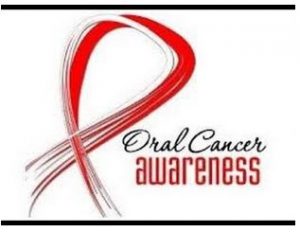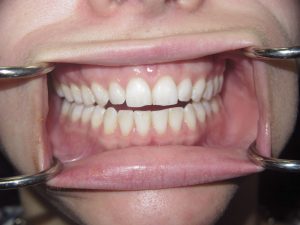April is Oral Cancer Month! This post is the first in a series talking about oral cancer - what you need to know and why it's important to be screened by a dentist.
One thing I know for certain about oral cancer is that I will know it when I smell it. Cancer, especially in the mouth, has a truly distinct odour that is so much more than even the worst case of bad breath. For this valuable skill, knowing when to follow my nose, I’ll al ways be grateful for the time I spent as a resident in the Foothills Hospital in Calgary in 2013. Most of my patients were recently diagnosed with head and neck cancer, and it was my job to screen them for tooth and gum disease before starting any radiation or chemotherapy. We saved a lot of lives in that hospital, but it would have made such a difference if the cancer could have been prevented in the first place.
ways be grateful for the time I spent as a resident in the Foothills Hospital in Calgary in 2013. Most of my patients were recently diagnosed with head and neck cancer, and it was my job to screen them for tooth and gum disease before starting any radiation or chemotherapy. We saved a lot of lives in that hospital, but it would have made such a difference if the cancer could have been prevented in the first place.
April is Oral Cancer Awareness Month. To do my part, this article will cover what you need to know about cancer of the head and neck. Also, I am planning to be at the Hamlets in Westsyde in April performing free oral cancer screenings – TBD, see more details on our Facebook page @HorizonDentalKamloops!
What to Watch Out For
At first, oral cancer is usually painless and asymptomatic, so screening by a dental professional is important in making an early diagnosis.
Early Signs & Symptoms
- White or dark red patches in your mouth, on lips or tongue
- Lumps or changes in the texture of mouth tissues
- Bleeding or numbness
- Sores/ulcers that do not heal
Late Signs & Symptoms
- Difficult or painful swallowing
- Changes in taste or tongue sensation
- Hoarse voice
- Swollen lymph nodes in the neck
- Difficulty moving tongue or jaw
Risk Factors
 The biggest risk factors for developing oral cancer are tobacco and heavy alcohol consumption.
The biggest risk factors for developing oral cancer are tobacco and heavy alcohol consumption.
The chemicals cause chronic irritation and have been shown to damage DNA, allowing cells to become cancerous.
In recent decades, the human papilloma virus (HPV) has been linked to more and more cancer diagnoses, especially the silent ones. This virus typically infects tissues in throat, causing cancers that can’t been seen until late symptoms, such as neck swelling and a hoarse voice, show up. 75% of Canadians will have an HPV infection in their lifetimes. It is also the number one cause of cervical cancer for women, which pushed for the development of two vaccines, Gardasil and Cervarix. Thankfully, there is now a program in BC that offers the Gardasil vaccine to both girls and boys ages 9 to 26 in an effort to combat the rise in HPV-related cancers.
Other risk factors include a poor diet low in antioxidants, a positive family history of cancer, and chronic sun exposure. Males are also more likely to develop head and neck cancer than females.
Diagnosis
At Horizon Dental, all new patients get an oral cancer screening during their first exam. This starts outside the mouth, by  checking the lymph nodes in the neck and below the jaw, and feeling the jawbones and joints. Inside the mouth, I will use my fingers to gently pull on the lips and cheeks to see into each corner and feel around for any lumps or bumps. I also look at the palate and tonsils, feel under the tongue, and lightly pull on the tongue itself to see the sides and feel the muscles. We also take several photos of the mouth and head, which can help me compare to any future changes.
checking the lymph nodes in the neck and below the jaw, and feeling the jawbones and joints. Inside the mouth, I will use my fingers to gently pull on the lips and cheeks to see into each corner and feel around for any lumps or bumps. I also look at the palate and tonsils, feel under the tongue, and lightly pull on the tongue itself to see the sides and feel the muscles. We also take several photos of the mouth and head, which can help me compare to any future changes.
If I have any concerns, the first step is to biopsy – remove a sample of the tissue and send it to the pathologist for investigation. I was trained by the best in Calgary, so the biopsies I perform are very small (typically under 1 cm) and absolutely pain-free, so it’s worth the effort to rule out a cancer. Also, I will take an x-ray of the area to ensure there are no changes to the teeth or bone structure that might give a clue as to what’s going on.
Unfortunately, some things can’t be biopsied so easily. So if I find a patient with a swollen lymph node, or any of the later signs of cancer, it’s an immediate referral to a family doctor or nurse practitioner to get checked out.
KEY POINTS
- Tobacco and alcohol are the biggest risk factors for oral cancer
- HPV infection can be prevented with a vaccine, which can in turn prevent oral cancer
- A biopsy is the best way to rule out oral cancer
- Prevention is key so it’s critical that your dentist perform regular oral cancer screenings
For more information or to book an appointment, please call 778-765-3928